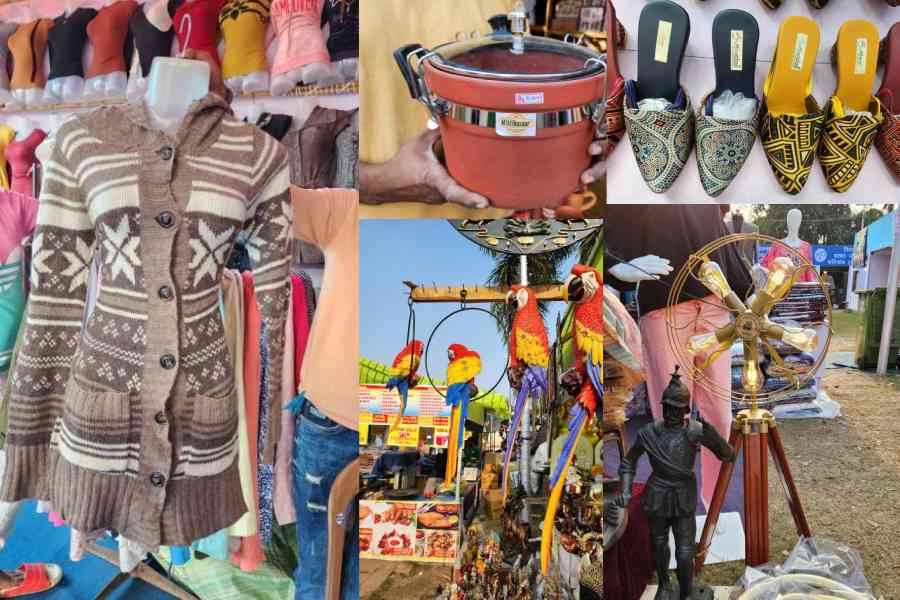Smaller fair, fewer stalls but Bidhannagar Mela (Utsav), at Central Park, is worth a visit.
The last edition featured 620 stalls, but this time there are fewer than 500, with several of even these lying vacant. A notable absence is the Bangladesh stalls, which were refused entry by the fair committee due to political tension.
This year, ask any sari vendor where they are from, and they declare “India, India!” before you can even finish your question.
“We get our saris from Santipur and Phulia, but they are at par with Dhakai jamdanis,” says Bablu Nath of Sneha Jamdani in Barasat. But the absence of Bangladeshi stalls hasn’t translated into higher sales for them.
“Crowds are thin, perhaps due to parallel fairs at Science City and New Town Mela Ground. In previous years, we would earn Rs 10-20,000 by 4’o clock but now we are struggling to make our bouni (first sale) at 4pm. To make things worse, the stall rent has tripled this year since an external agency is handling the fair’s management,” Nath rues.
Shambhu Paul, who runs the popular Mabesha sari pavilion at the fair annually, claims that some vendors sitting at Bangladesh stalls in previous years were actually Indians. “They would buy jamdanis from Burrabazar and resell them here at a premium by faking a Bangal accent,” says Paul, adding that a couple of these vendors have returned this year but are now selling as Indians.
The fair will continue until January 6, from 3 pm to 9 pm.
Woollen dresses
Stall: P16
This stall is all about winter essentials – caps, coats, trousers, and a few standout woollen dresses. “These dresses are free size and come with full sleeves, pockets, and hoods,” says Rahul Khatri of Ayushee Fashion. “They’re popular as casual wear. Our coats are also selling well since women now wear them over saris too.”
Price: Rs 850 (negotiable)
Clay pressure cooker
Stall: J3
This stall features clay bottles, water dispensers, crockery, and pressure cookers.
“Aluminium is unsuitable as a pressure cooker as it leaches into food and poses health risks. If you weigh your aluminium cooker after a year, you’ll notice it has lost weight – that’s the metal you consumed,” says Chandan Kumar Shaw of Mitti Bazaar. “Clay is safe, eco-friendly, and has been used in cooking since ancient times.”
The clay cooker doesn’t whistle but comes with a glass lid, allowing users to monitor food by its changing colour.
Price: Rs 2,100 (4-litre cooker)
Macaw wall hangings
Stall: K27
If real macaws are too challenging to keep, try these artificial but life-like alternatives.
“These birds are selling like hotcakes, with four to five pieces selling on a good day,” says Amit Pahari of Medinipur. Made of marble dust, they are sculpted, painted with fabric paint, and coated with lacquer. They are washable and ideal for balconies.
Price: Rs 900 to Rs 2,200 (for birds over 2ft in length)
Juttis
Stalls: C36 and A25
The Juttiwala stall from Patiala has footwear for all occasions, from ethnic Kolhapuri styles to phulkari designs and funky ones adorned with shells and jute.
“We also have juttis with payals, known as jhanjhra, leather juttis with thread and sequin work, zari embellishments, and high-heeled silk shoes for weddings,” says Hemant Kumar. The soles are rather soft and comfortable, thanks to their handmade craftsmanship.
Price: Rs 550–1,800
Pedestal lights
Stall: D8
Everyone crossing this stall is stopping, staring and asking vendor Nafis Hassan if their item on display is a light or fan. “It looks like pedestal fan but in place of blades are Edison bulbs,” says the vendor from Uttar Pradesh. “They run on electricity, have a metal body, stand on wooden tripods, and have an antique look.” His entire stall, in fact, specialises in antique curios like gramophones and statuettes.
Price: Rs 6,000
Soap paper
Stall: F22
Teenagers are flocking to these cute boxes shaped like miniature trolley suitcases. Inside are colourful bits of paper that turn into soap when wet. “Sanitisers have become popular post-pandemic, but their bottles can be bulky and prone to leakage, especially when kept in bags. This is a more practical solution for handwashing,” says Ashim Chandra Majumdar.
Price: Rs 60
Nepalese food
Stall: Sekuwa Ghar, food court
“The momos Calcutta is familiar with are Tibetan-style, but ours are different,” says Amrit Acharya, a chef-cum-entrepreneur from Nepal who is preparing the dishes himself.
There’s Sekuwa (Nepali kebabs), Sandeko Momo (topped with traditional spices), Jhol Momo (served in a thick gravy), and Kothey Momo (half-fried, half-steamed). You can also try Sel Roti – a slim, doughnut-shaped sweet rice bread served with Piro Aloo (spicy potato). “Sel Roti is a staple at weddings and auspicious occasions,” he says.
Price: Rs 100–250 for vegetarian, chicken, or mutton momos (five pieces); Rs 100 for Sel Roti (five pieces)











